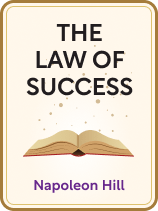

This article is an excerpt from the Shortform book guide to "The Law of Success" by Napoleon Hill. Shortform has the world's best summaries and analyses of books you should be reading.
Like this article? Sign up for a free trial here.
Do you have a goal in life? What are some things you should consider when defining a goal to strive towards?
Most people would agree that it’s important to have goals in life to work toward. In practice, however, many people don’t know how to set goals that are both meaningful and realistic.
Self-help author Napoleon Hill explains how to define your goal.
Define a Specific Goal
While you work on cultivating a positive attitude, define a specific goal that you want to achieve. This will help you create a clear vision of what will make you feel successful, and it will give your subconscious mind a clear direction to move toward.
(Shortform note: Robbins (Awaken the Giant Within) expands on how defining a specific goal contributes to success. According to him, the more specific you are about what you want, the easier it is to imagine the benefits of achieving it—these positive expectations increase your motivation to take proactive steps forward. In addition, your goal-specificity allows you to plan and prepare for potential obstacles, which improves your chances of overcoming setbacks and helps you maintain momentum toward what you want.)
Focus on Your Natural Talents and Interests
In his book The Law of Success, Napoleon Hill offers advice on how to define your goal: Focus on using your natural talents and interests. He explains that this will improve your chances of successfully achieving your goal in two ways:
1) You’re more likely to enjoy pursuing a goal that genuinely interests you. Your enjoyment will motivate you to take action to achieve your goal, which will increase your productivity and allow you to gain momentum with little effort.
2) You’ll be able to leverage your existing skills and knowledge, which will help you make progress more quickly and effectively than if you try to develop new abilities from scratch.
Hill claims that these two benefits will inspire you to think positively about achieving your goal. These thoughts will leave a positive impression on your subconscious mind that will train it to work in alignment with what you want to achieve.
| Intrinsic Motivation Is Key to Achieving Success Many psychologists and self-improvement authors mirror Hill’s argument that focusing on natural inclinations is key to maintaining a positive attitude and achieving success. One idea underlies this argument: That all behavior is driven by the need to fulfill one of two motivation types—intrinsic or extrinsic. Intrinsic motivation comes from within: You accept your needs and feel comfortable expressing them by engaging in activities that provide internal satisfaction or fulfillment. For example, you want to be an entrepreneur because you enjoy your work and aren’t worried about how others judge you. Because doing this work fulfills your inner needs, you find it easy to maintain a positive attitude and achieve success. Extrinsic motivation comes from your environment: You ignore your needs in favor of seeking acceptance from others by engaging in activities that encourage external rewards. For example, you want to be an entrepreneur because you think it will garner admiration and financial success. However, because doing this work doesn’t fulfill your inner needs, you struggle to maintain a positive attitude and make progress on what you’ve set out to do. |

———End of Preview———
Like what you just read? Read the rest of the world's best book summary and analysis of Napoleon Hill's "The Law of Success" at Shortform.
Here's what you'll find in our full The Law of Success summary:
- How your subconscious mind creates your life experiences
- Why the only way to achieve success is to realign your habitual thoughts
- Actionable advice on how to retrain your subconsciousmind for success






